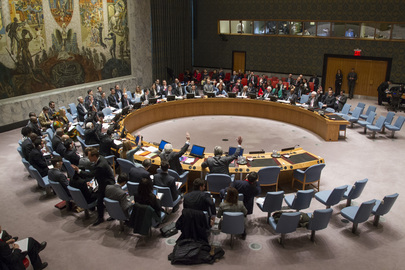Security Council Renews Measures against Illicit Oil Exports from Libya, Grants Mandate Extension for Expert Panel Assisting Sanctions Committee
The UN Security Council has renewed until 31 July 2017 the measures imposed by its resolution 2146 (2014) on the prevention of illicit crude oil exports from Libya.
Acting under Chapter VII of the United Nations Charter in adopting resolution 2278 (2016), the Council extended measures requiring a vessel’s flag State to take the necessary measures to prevent ships from loading, transporting or discharging crude oil from Libya.
The text also required Member States to prevent vessels carrying Libyan crude from entering their ports, and to prevent their nationals, entities or individuals on their territory from engaging in any financial transactions with respect to such crude oil.
Also by today’s action, the Council extended, until the same date, the mandate of the Panel of Experts assisting the Libya Sanctions Committee established under resolution 1970 (2011). It requested that the Government of National Accord confirm to the Committee as soon as it exercised sole and effective oversight over the National Oil Corporation, the Central Bank of Libya and the Libyan Investment Authority.
Further, the Council requested that the Government of National Accord appoint a focal point to brief the Committee and provide information relevant to its work.
By further terms of the text, the Council urged Member States to provide the Government of National Accord with security and capacity-building assistance in response to threats against Libya’s security and in defeating terrorist organizations operating in the country. It also urged them to improve the monitoring and control of arms or related materiel supplied, sold or transferred to Libya.
Speaking after the vote, Ibrahim Dabbashi (Libya) said his delegation had worked closely with Security Council members in drafting the resolution, which represented an additional step to help the Libyan people protect and develop their national wealth. Although the delegation had not heard any serious argument against the proposal to create a Libyan institution for investment, it was surprising that the Council had not responded to a request for the creation of such a body.





